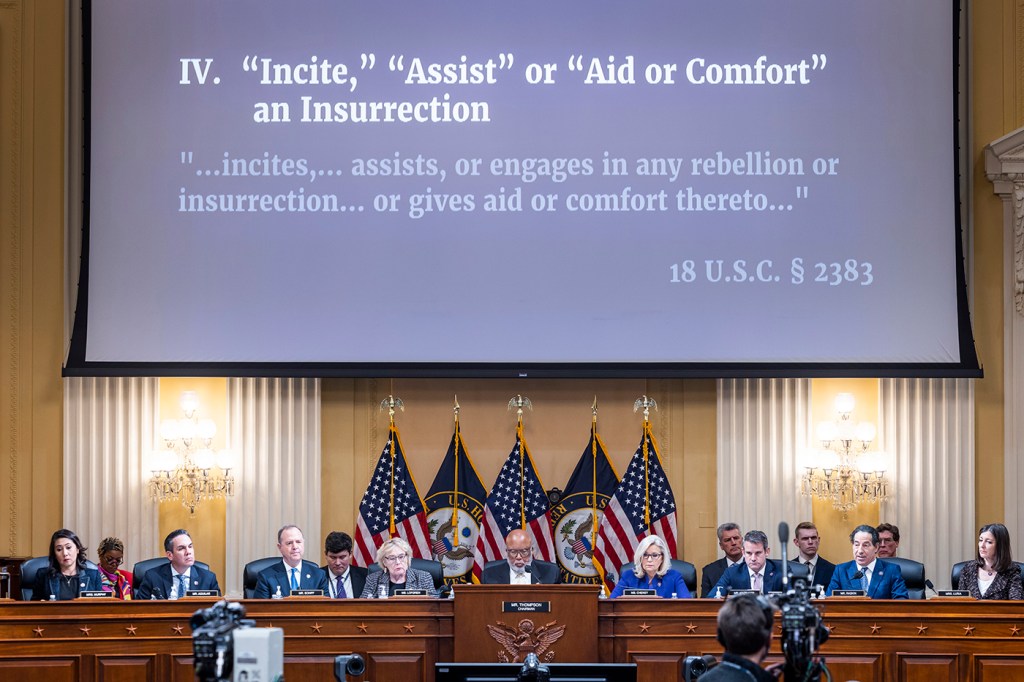How might the Department of Justice use the Jan. 6 committee’s criminal referrals?

The House select committee tasked with investigating the Jan. 6 attacks on the U.S. Capitol outlined its recommendations for criminal referrals against former President Donald Trump and his allies during the panel’s last official public meeting on Monday.
The highly anticipated conclusion to the 18-month investigation yielded several notable findings, accusing the former president of violating four federal laws in connection with his role in the attacks and a broader scheme to overturn the results of the 2020 presidential election.
The referrals don’t have any legal application, are nonbinding and largely symbolic. Congress has no formal say in how the federal government prosecutes anyone—let alone a former president. The referrals essentially amount to letters sent to the Department of Justice outlining allegations of crimes as a result of the committee’s inquiry.

But Northeastern experts say the recommendations could speed up the Department of Justice’s ongoing prosecution of Trump—now in the hands of an independent special counsel.
“My impression is that it could accelerate the process by providing additional evidence to [the] DOJ and, politically, offering a modicum of cover,” says Daniel Medwed, Northeastern University distinguished professor of law and criminal justice.
How the Justice Department will use any of the evidence associated with the criminal referrals and the committee’s investigation is “not something we’ll ever know,” says Michael Meltsner, the George J. and Kathleen Waters Matthews Distinguished University Professor of Law.
The department’s duty is to be tight-lipped, especially given the political sensitivities surrounding the prosecution of a former president, Meltsner says.
Still, the committee may have unearthed new evidence that could prove useful in the final analysis.
“There may be statements from various people who are facilitating [the investigation] that the DOJ doesn’t have yet,” Meltsner says, adding that the committee has succeeded in “telling the country, to the extent that people aren’t living in their own little bell jars, a story” about the actions of the powerful.
“The committee’s submissions may actually make whatever the department does look somewhat more political, but Trump supporters will claim that party politics is the motivation regardless of what the submission entails,” he says. “The only exception to this scenario I can see is if the committee passes on hard evidence that has not been previously known by prosecutors.”
During Monday’s hearing, Rep. Jamie Raskin, D-Maryland, said that the assault on the U.S. Capitol on Jan. 6 has precipitated “hundreds of individual criminal offenses, most of which are already being prosecuted by the Department of Justice.” Earlier this year, the committee had the opportunity to submit much of the panel’s evidence pertaining to Trump and his former lawyer John Eastman, who was involved in Trump’s pressure campaign on then-Vice President Mike Pence to decertify the election results, to a federal judge for vetting, Raskin said.
“The judge concluded that both former President Donald Trump and John Eastman likely violated two federal criminal statutes,” he said. “This is the starting point for our analysis today.”
The committee invoked a statute that pertains to the obstruction of an official proceeding, which “makes it unlawful for anyone to corruptly obstruct, influence or impede any official proceeding of the United States government,” Raskin said.
“We believe that the evidence described by my colleagues today and assembled throughout our hearings warrants a criminal referral of former President Donald J. Trump, John Eastman and others for violations of this statute,” Raskin said.
Three other statutes were referenced in connection with the criminal referral, including one that alludes to “conspiracy to defraud the United States,” another that mentions “conspiracy to make a false statement,” and a third that punishes those who “incite, assist, or aid and comfort an insurrection.”
Additionally, the committee recommended that four sitting members of the House of Representatives who didn’t comply with congressional subpoenas be sanctioned by the House Ethics Committee. The House committee’s full report is set to be released before the end of the week.
For media inquiries, please contact media@northeastern.edu.






